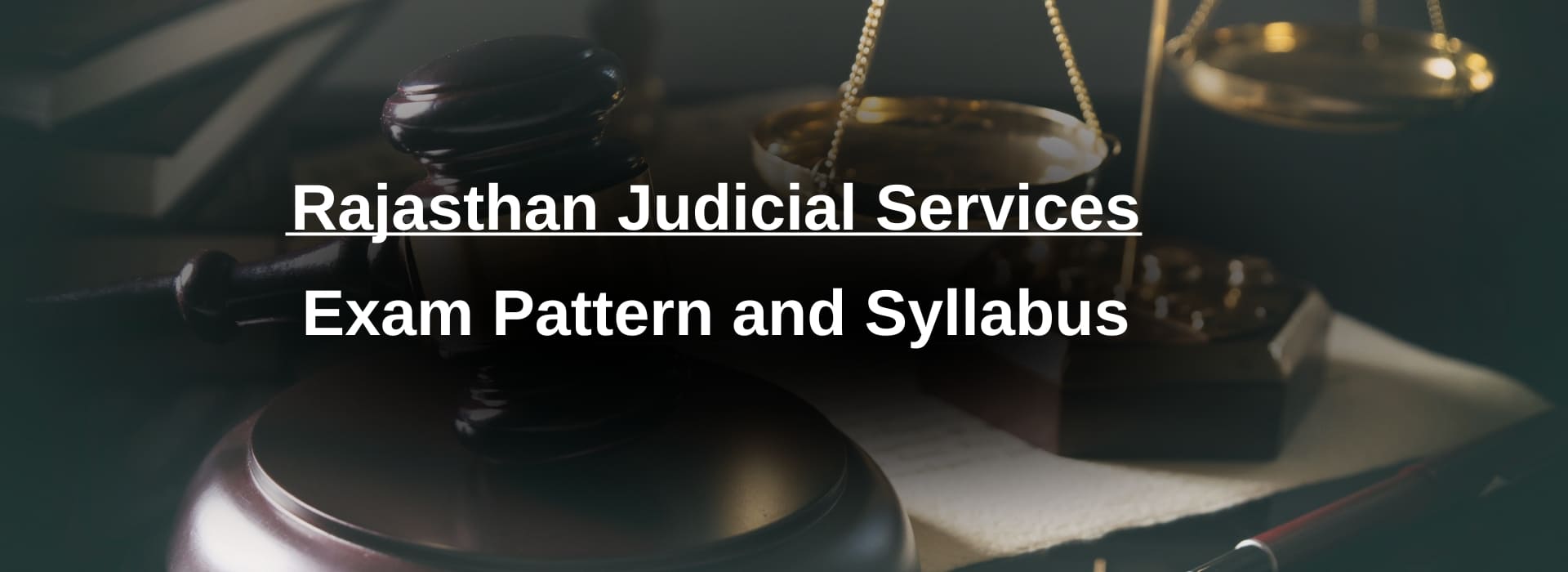
Rajasthan Judicial Services Exam Pattern and Syllabus 2025
The Rajasthan Judiciary exam is made up of three stages: the Prelims, the Mains, and the Interview. Read on to learn about the Rajasthan Civil Judge Exam Pattern for 2025!
To become a judge in Rajasthan, you must pass all three stages of the exam. The Rajasthan Judiciary releases the updated pattern, syllabus, marking scheme, and subject lists for each stage: Prelims, Mains, and Interviews.
This blog will give you an overview of the Rajasthan Judiciary Exam Pattern along with some insights from previous years.
In this blog, we will cover:
- Overview of the RJS Exam Pattern 2025
- Minimum qualifying marks required to pass the exam
Overview of the RJS Exam Pattern 2025
According to the official notice, the Rajasthan Judicial Services exam has three stages: the Prelims, the Mains, and the Viva Voce (Personal Interview).
Each stage has its own exam pattern, and all stages are qualifying. This means that you need to pass each stage to move to the next one.
- You can only take the Mains exam if you pass the Prelims.
- You can only take the Interview if you pass the Mains.
Rajasthan Civil Judge Exam Pattern 2025 for Prelims
In the Preliminary Exam, 70% of the weight is given to Law Paper-I and Law Paper-II, while 30% is for language proficiency.
Prelims Exam Breakdown:
| Exam Mode | Offline |
|---|---|
| Question Type | Objective (MCQs) |
| Number of Questions | 100 |
| Maximum Marks | 100 |
| Duration | 2 Hours |
| Marks for Correct Answer | +1 |
| Negative Marking | No |
Rajasthan Civil Judge Exam Pattern 2025 for Mains
Once you pass the Prelims, you’ll face the Mains Exam. This is where your legal knowledge and drafting abilities are truly tested. The Mains exam consists of four papers:
| Paper | Marks | Duration |
|---|---|---|
| Law Paper-I | 100 | 3 Hours |
| Law Paper-II | 100 | 3 Hours |
| Hindi Essay | 50 | 2 Hours |
| English Essay | 50 | 2 Hours |
Prelims Exam Paper Pattern:
| Exam Mode | Offline |
|---|---|
| Question Type | Descriptive |
| Subjects | Law (Paper 1 & 2), Language (Hindi, English) |
| Duration | 3 hours for Law papers, 2 hours for Language papers |
| Total Marks | 300 |
| Negative Marking | No |
Rajasthan Civil Judge Exam Pattern 2025 – Interview Process
The third phase of the exam is the Interview. To qualify for this stage, candidates need to score a total of 40% marks and at least 35% in each law paper in the Mains exam. The Interview is worth 35 marks.
The Interview will focus on your educational background, work experience, current affairs knowledge, understanding of the law, and general knowledge. You can also earn extra points if you know the Rajasthani dialect and culture.
The Interview is designed to test your personality, legal knowledge, and confidence.
Interview questions may cover your qualifications, character, legal expertise, and suitability for the role of a judge. Candidates should focus on improving legal knowledge, case analysis, communication skills, and overall confidence.
It’s also important to stay updated on current affairs and general knowledge as interviewers may ask about them. Interviewers may also ask about Rajasthani dialects, customs, and social issues.
Your interview score will be added to your written exam marks, so every point counts!
Minimum Qualifying Marks for Rajasthan Judiciary
Only candidates who achieve the minimum qualifying marks will be shortlisted for the next stage. Here’s a breakdown of the minimum marks needed for different categories:
| Category | Minimum Qualifying Marks (Prelims) | Minimum Marks in Each Law Paper | Minimum Marks in Total |
|---|---|---|---|
| General | 45% | 35% | 40% |
| SC | 40% | 30% | 35% |
| ST | 40% | 30% | 35% |
| EWS (Economically Weaker Section) | 45% | 35% | 40% |
| OBC (Other Backward Class) | 45% | 35% | 40% |
Conclusion
The Rajasthan Judiciary exam is a great opportunity for those who want to become a judge in Rajasthan. Understanding the exam pattern and preparing according to the syllabus will give candidates a better chance of success.
Aspiring candidates can find detailed information about the Rajasthan Judiciary Syllabus and RJS Exam Pattern on the official platform, which will help them in their exam preparation.